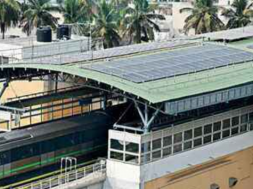
Dive Brief:
- Spokane, WA City Council unanimously advanced a plan to waive the building and construction permit fees for new EV charging stations and solar panels. Council President Ben Stuckart told Smart Cities Dive the fees for solar systems typically average around $100, and permit fees for EV charging stations are $50.
- “This came about when we were reading about the tariffs on some of the foreign production of solar systems,” Stuckart told Smart Cities Dive. “So we were like, ‘What do we charge and can we get rid of ours at least to try locally?'”
- The proposal got a first reading by the council on Monday night. It will receive a public hearing and final vote next week.
Dive Insight:
Stuckart acknowledged these waivers are a “small change” and “one step in the right direction,” but could be appealing to residents and business owners who want to install solar panels or EV charging stations. Currently, there are around 20 such charging stations in Spokane, with solar panels starting to grow in use, according to Stuckart.
Local energy company Avista is looking to put together a pilot program to install more EV charging stations, while Tesla has also shown an interest in providing more stations to Spokane, KREM reports. Stuckart said that given the lack of charging infrastructure in the northern part of the United States, Spokane could lead the way. “If you’re in the northern United States, and you’re going between Minneapolis and Seattle, driving across the country, we want to make it easy for people to charge up when they’re going across the country,” Stuckart said. “You’ve got to have that infrastructure.”
Stuckart also called on the Washington State Legislature to enact a carbon tax on fossil fuel usage, which would allow the state to invest more in alternative energy. He cited the example of the nearby town of Dayton, WA, which lost 10% of its workforce when its asparagus plant shut down in the early 2000s, but now its largest industry is from wind farms. “If we look in eastern Washington, the economic future is going to be alternative energy,” Stuckart said. “We just need to heavily invest in that, and that to me means taxing fossil fuels so we get off them and invest that revenue into alternatives. It will create a stronger economy.”
It is a small step to waive these fees, but if similar schemes roll out in other cities, it could encourage more people to use alternative energy and electric vehicles and encourage more developers and business owners to invest. And it builds on the city’s work already to emphasize energy alternatives and environmental sustainability, having voted last year to add an environmental action plan, but not tying itself to the Paris climate accord or the Compact of Mayors.
















